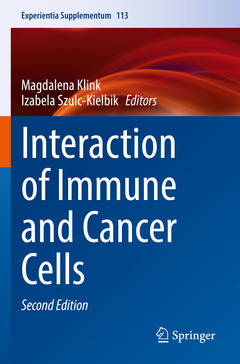Interaction of Immune and Cancer Cells (2nd Ed., 2nd ed. 2022) Experientia Supplementum Series, Vol. 113
Coordonnateurs : Klink Magdalena, Szulc-Kielbik Izabela

Now, it its second edition, this book summarizes the role of immune cells in tumor suppression and progression. It describes in detail why tumor cells can survive and spread in spite of the antitumor response of immune cells.
Since immunotherapy is an attractive approach to cancer therapy, this book also provides information on the two main strategies: monoclonal antibodies and adaptive T cell immunotherapy, with a focus on recent human clinical trials. A newly added chapter also focuses on the role of Natural Killer cells in tumor progression.
The book provides a state-of-the-art, comprehensive overview of immune cells in cancer and is an indispensable resource for researchers and practitioners working or lecturing in the field of cancer research and immunology.
Chapter 1: Cancer immunoediting - elimination, equilibrium and immune escape in solid tumors.- Chapter 2: Tumor – Stroma Interaction and Cancer. - Chapter 3: Tumor-infiltrating lymphocytes and their role in solid tumor progression.- Chapter 4: Tumor-associated macrophages – reasons to be cheerful, reasons to be fearful.- Chapter 5: Polymorphonuclear neutrophils and tumors: friend or foe?.- Chapter 6: Role of NK cells in tumor progression.- Chapter 7: The role of myeloid-derived suppressor cells in tumor growth and metastasis.- Chapter 8: Cancer stem cells – an ever hiding foe.- Chapter 9: Adoptive T-cell immunotherapy – Perfecting self-defenses.- Chapter 10: Monoclonal antibodies to CTLA-4 with focus on ipilimumab.
Magdalena Klink received her PhD in Immunology at the University of Lodz, Poland, in 1994. She was Senior Research Assistant at the Microbiology and Virology Center of the Polish Academy of Sciences, Lodz, Poland and Post-doctoral researcher at the Department of Immunology, College of Natural Sciences, Chungnam National University, Taejon, Republic of Korea. Since 2004 she has been working at the Institute of Medical Biology of the Polish Academy of Sciences in Lodz, Poland. In 2005 she completed her post-doctoral studies in Immunology (Habilitation). Since 2016 she is a Team Leader of the Molecular and Cellular Biology Lab at above Institute and since 2017 she is a full Professor. She was the Principal Investigators of several grants from national sources. She received awards for research including the Rector of the University of Lodz, the Minister of Education, The Scientific Committee of Conference and the Director of the Institute for Medical Biology, PAS. She was a supervisor of a few doctoral thesis. She has been serving as the Associate Editor of the journal Mediators of Inflammation (2007-2017 and as the Scientific Editor for Current Awareness Bulletin for Novartis Pharma AG company (2005-2008). She was a lecturer in the Academy of Cosmetics and Healthcare, Warsaw Poland (2014-2018).
Izabela Szulc-Kielbik received her microbiology MSc in 2010 at the Faculty of Biology and Environmental Protection, University of Lodz. After graduation she has started working as research assistant in the Institute of Medical Biology at the Polish Academy of Sciences in Lodz, Poland, where she was preparing her doctoral thesis. In 2015 she received her PhD degree with distinction in the medical biology specialization. Since 2016 she is a member of the Molecular and Cellular Biology Lab at the Institute of Medical Biology. Izabela has authored more than 15 scientific publications and she was a main investigator or co-investigator in 4 different
Date de parution : 02-2023
Ouvrage de 350 p.
15.5x23.5 cm
Date de parution : 02-2022
Ouvrage de 350 p.
15.5x23.5 cm



